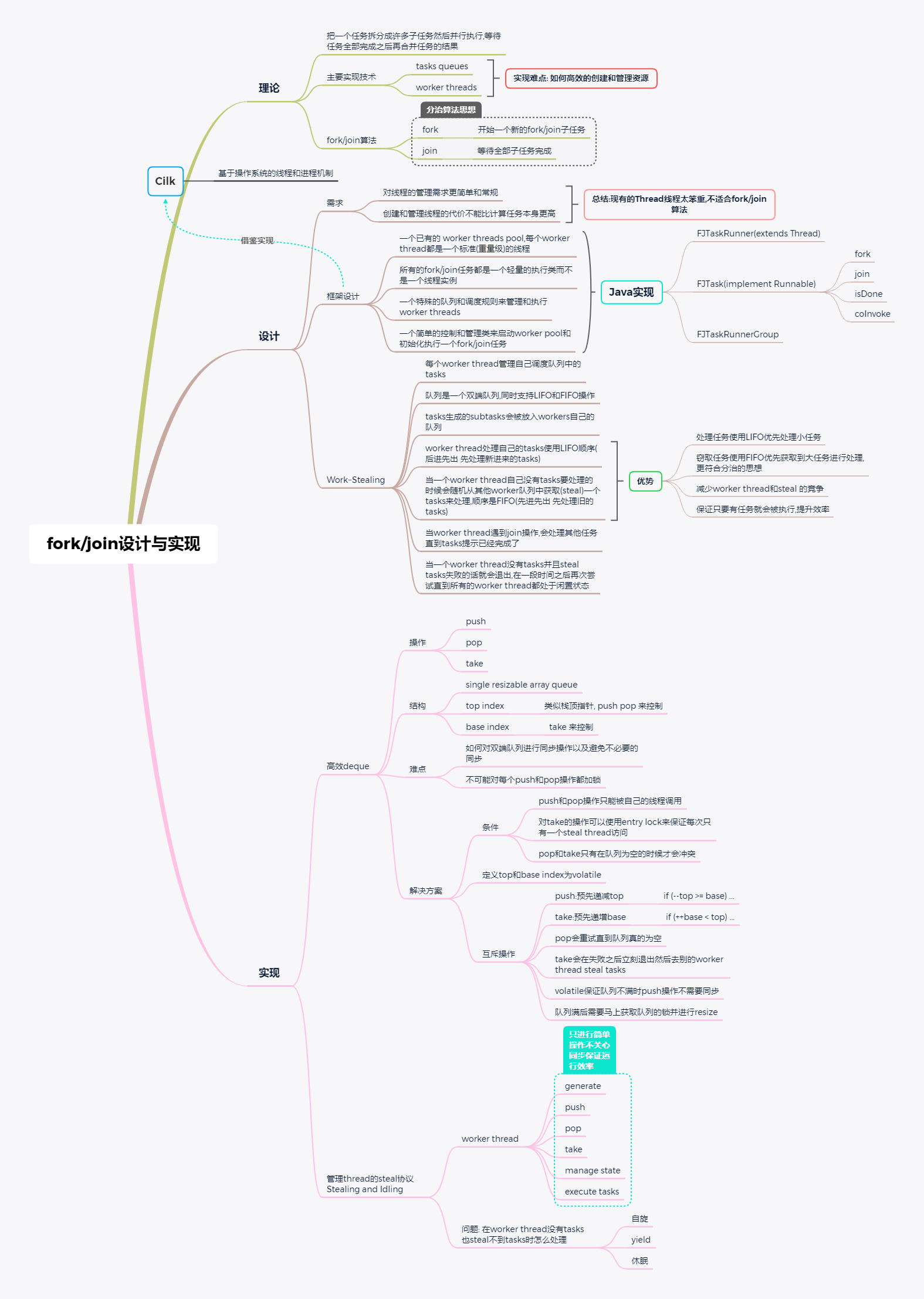
前言
这篇blog主要是在看了Doug Lea的fork/join实现的paper之后的一个总结.
文章主要参考了:
- A Java Fork/Join Framework(PDF)
- Java Fork/Join框架—翻译
- Overview of package util.concurrent Release 1.3.4.(Doug Lea的fork/join代码实现)
整个paper笔记的思维导图就是上面的图片,这里也留一下xmind文件链接: fork-join.xmind
代码
由于paper以及翻译对实现的思路讲解已经很详细了,这里就不再赘述,主要还是结合代码实现再看一下整个框架.
就像论文中提到的,Java部分的实现主要为下面三个类:
- FJTask(implement Runnable)
- FJTaskRunner(extends Thread)
- FJTaskRunnerGroup
下面就分别看一下三个类的代码实现.
FJTask
fork/join代码都非常的简单,因为这只是一个实现了Runnable接口的轻量线程类
// 下面贴出来的是论文中讲到的FJTask有的方法,其余的一些辅助的方法也就不加进来了
private volatile boolean done; // = false;
public final boolean isDone() { return done; }
public static FJTaskRunner getFJTaskRunner() {
return (FJTaskRunner)(Thread.currentThread());
}
public void fork() { getFJTaskRunner().push(this); }
public void join() { getFJTaskRunner().taskJoin(this); }
public static void coInvoke(FJTask task1, FJTask task2) {
getFJTaskRunner().coInvoke(task1, task2);
}FJTaskRunner
这个类是整个fork/join框架的核心,代码也比较多
push
/**
* Push a task onto DEQ.
* Called ONLY by current thread.
**/
protected final void push(final FJTask r) {
int t = top;
/*
This test catches both overflows and index wraps. It doesn't
really matter if base value is in the midst of changing in take.
As long as deq length is < 2^30, we are guaranteed to catch wrap in
time since base can only be incremented at most length times
between pushes (or puts).
*/
// 这里是重点,注释中也已经讲的很清楚了
if (t < (base & (deq.length-1)) + deq.length) {
deq[t & (deq.length-1)].put(r);
top = t + 1;
}
else // isolate slow case to increase chances push is inlined
slowPush(r); // check overflow and retry
}
// slowPush主要是为了应对数组的resize
/**
* Handle slow case for push
**/
protected synchronized void slowPush(final FJTask r) {
checkOverflow();
push(r); // just recurse -- this one is sure to succeed.
}pop
/**
* Return a popped task, or null if DEQ is empty.
* Called ONLY by current thread.
* <p>
* This is not usually called directly but is
* instead inlined in callers. This version differs from the
* cilk algorithm in that pop does not fully back down and
* retry in the case of potential conflict with take. It simply
* rechecks under synch lock. This gives a preference
* for threads to run their own tasks, which seems to
* reduce flailing a bit when there are few tasks to run.
**/
protected final FJTask pop() {
/*
Decrement top, to force a contending take to back down.
*/
int t = --top;
/*
To avoid problems with JVMs that do not properly implement
read-after-write of a pair of volatiles, we conservatively
grab without lock only if the DEQ appears to have at least two
elements, thus guaranteeing that both a pop and take will succeed,
even if the pre-increment in take is not seen by current thread.
Otherwise we recheck under synch.
*/
if (base + 1 < t)
return deq[t & (deq.length-1)].take();
else
// 这就是论文中提到的pop失败之后会重试,直到队列真的为空
return confirmPop(t);
}
/**
* Check under synch lock if DEQ is really empty when doing pop.
* Return task if not empty, else null.
**/
protected final synchronized FJTask confirmPop(int provisionalTop) {
if (base <= provisionalTop)
return deq[provisionalTop & (deq.length-1)].take();
else { // was empty
/*
Reset DEQ indices to zero whenever it is empty.
This both avoids unnecessary calls to checkOverflow
in push, and helps keep the DEQ from accumulating garbage
*/
top = base = 0;
return null;
}
}take
/**
* Take a task from the base of the DEQ.
* Always called by other threads via scan()
**/
protected final synchronized FJTask take() {
/*
Increment base in order to suppress a contending pop
*/
int b = base++;
if (b < top)
return confirmTake(b);
else {
// back out
// take的机制就是类似于fail fast, 会去尝试窃取其他线程的taks
base = b;
return null;
}
}
/**
* double-check a potential take
**/
protected FJTask confirmTake(int oldBase) {
/*
Use a second (guaranteed uncontended) synch
to serve as a barrier in case JVM does not
properly process read-after-write of 2 volatiles
*/
synchronized(barrier) {
if (oldBase < top) {
/*
We cannot call deq[oldBase].take here because of possible races when
nulling out versus concurrent push operations. Resulting
accumulated garbage is swept out periodically in
checkOverflow, or more typically, just by keeping indices
zero-based when found to be empty in pop, which keeps active
region small and constantly overwritten.
*/
return deq[oldBase & (deq.length-1)].get();
}
else {
base = oldBase;
return null;
}
}
}
剩下的代码就是对dqueue的resize和一些辅助的函数
FJTaskRunnerGroup
主要是对FJTaskRunner的管理的一些辅助函数
/** The threads in this group **/
protected final FJTaskRunner[] threads;
/** Group-wide queue for tasks entered via execute() **/
protected final LinkedQueue entryQueue = new LinkedQueue();
/**
* Create a FJTaskRunnerGroup with the indicated number
* of FJTaskRunner threads. Normally, the best size to use is
* the number of CPUs on the system.
* <p>
* The threads in a FJTaskRunnerGroup are created with their
* isDaemon status set, so do not normally need to be
* shut down manually upon program termination.
**/
public FJTaskRunnerGroup(int groupSize) {
threads = new FJTaskRunner[groupSize];
initializeThreads();
initTime = System.currentTimeMillis();
}
/**
* Arrange for execution of the given task
* by placing it in a work queue. If the argument
* is not of type FJTask, it is embedded in a FJTask via
* <code>FJTask.Wrap</code>.
* @exception InterruptedException if current Thread is
* currently interrupted
**/
public void execute(Runnable r) throws InterruptedException {
if (r instanceof FJTask) {
entryQueue.put((FJTask)r);
}
else {
entryQueue.put(new FJTask.Wrap(r));
}
signalNewTask();
}whats else
首先,Doug Lea的论文真的很牛逼,可以说把整个框架的实现细节都讲的很清楚了,而且在代码中无处不在的各种注释也对于框架的理解非常有用.在源码包里还有对应生产的JavaDoc可以说阅读Java基础代码的整体体验都是非常不错的(集合包中的注释也是非常的完整).
其次,最近开始尝试使用思维导图来整理知识,这算是第一次尝试,总体感觉还是很不错的.